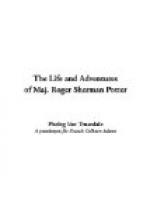The little deformed man was in nowise pleased with such a comparison of his acquirements, and answered by saying, it did not become him to hold argument with a man, however high his military position, who would place genius in the scale with brute instinct. Seeing the pain he had caused the little man, the major said he meant no offence, and was ready to get upon his knees, dissolved in tears, if that were necessary to a good and sufficient apology. In fine, it must be said of the major, that, although he was at times emphatic in his eccentric declarations, he would not knowingly wound the feelings of those who had done him no harm. And, unlike some editors of New York newspapers, he always held himself accountable according to the strictest military rules, nor was he ever known to regard the character of his fellow in arms as of so little worth, that he would daily splinter it for the amusement of the public.
The major said he had come to see if I was comfortable, and to inform me that he had thrown the editor of the Patriot a sly hint about noticing the arrival of so distinguished a person as myself. And the editor had assured him it would be properly recorded in his columns, and so embroidered as to make it pleasant to his fancy. The major now took leave of me, satisfied within himself of having convinced me that he was a man of stupendous parts. I must not forget to say that he promised to call again, and be present at the lecture in the evening, inasmuch as his absence could not fail to be seriously felt.
Night came on, and with it there gathered into the lecture room of the Orthodox Church, an audience of many bonnets and much respectability. Proverbially inquisitive, the people of the good old town of Barnstable were on tip-toe, to see the man of whose curious figure they had heard so much. And as if to gratify their curiosity, Giles Sheridan now rose, frisked the little black scroll about in his fingers, wiped the sweat nervously from his brow, and, in a faltering voice, gave an interesting sketch of the early life of his darling poet. This he continued for more than an hour, now warming into eloquence, now subsiding into a low, desponding voice. But his hearers sat unmoved, nor was one hand of applause raised to cheer his too misgiving heart. They wondered, and listened, and looked at one another, as was the custom of the country. The little deformed man, however, took it as a proof that he had failed to interest them; and this sorely taxed his sensitive nature. I ought also not to forget to mention that the speaker was twice interrupted by the major, who begged that he would state the exact quality of poetry written by his friend, the poet. The audience took this interruption very good naturedly, while the speaker gratified the major’s curiosity by reciting a number of verses written by him. The major then said he was fully satisfied that this Mr. Crabbe must have been a great poet; but he thought if the




